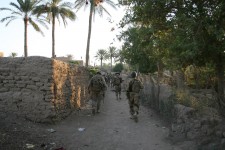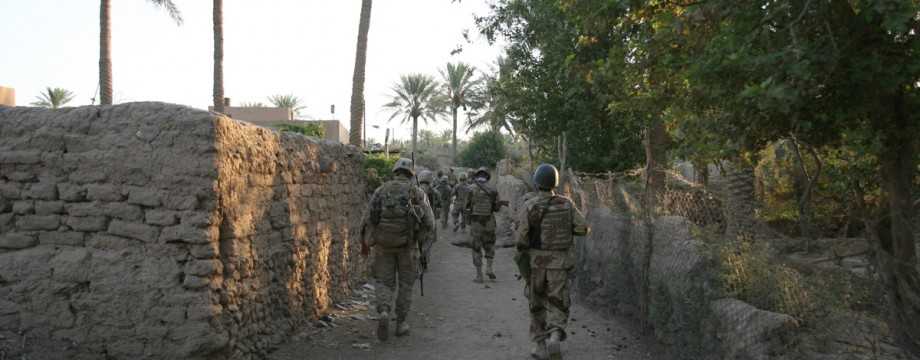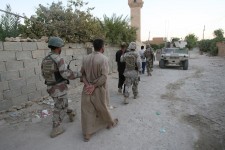 Weapons Company conducted Operation Guardian Tiger IV in Baghdadi. Source — First Marine Division Press Release
Weapons Company conducted Operation Guardian Tiger IV in Baghdadi. Source — First Marine Division Press Release
Contents
News
Hawaii-based Marines, Iraqi soldiers net suspects
By Sgt. Roe. F. Seigle
1st Marine Division
September 13, 2006
BAGHDADI, Iraq — Marines from 3rd Battalion, 3rd Marines, known as “America’s Battalion,” and Iraqi soldiers recently completed a census operation dubbed “Operation Guardian Tiger IV” in the Euphrates River city of Baghdadi — a town of approximately 15,000.
The local government and Iraqi Security Forces can now put names and faces to residents throughout this city in the western Al Anbar province about 120 miles northwest of Baghdad.
Upon completion of the mission, the Marines from the Hawaii-based Weapons Company, 3rd Battalion, 3rd Marine Regiment had an accurate census of the city’s population.
The purpose of a census is to record the demographics of an area as well as the town’s population. It also provides employment statistics and the number of vehicles belonging to residents in the area, said Cpl Austin Bridgewater, 22, a native of Richmond, Va., and an intelligence analyst assigned to the Hawaii-based 2nd Battalion, 3rd Marine Regiment. Marines from 2nd Battalion are slated to replace the Marines from 3rd Battalion, who are wrapping up their seven-month deployment to Iraq.
The Marines and Iraqi Soldiers also spread word of opportunities to join the police and sent a message out to insurgents – “there is nowhere you can hide.”
The locals and tribal leaders told Marines and Iraqi Soldiers they would support future police recruiting efforts. This is a turning point for Iraqi Security Forces in the fight against the insurgency in this city, said Maj Eric Kelly, 36, the commanding of Weapons Company.
When the Marines from 3rd Battalion arrived in Iraq, insurgents threatened tribal leaders and any residents who cooperated with coalition forces, said Kelly.
However, recent screenings in Baghdadi resulted in more than 200 qualified candidates being sent to police academies in Jordan and Baghdad where they will undergo eight to 10 weeks of training.
Once the Baghdadi Police Force reaches a targeted number of police officers, future graduates of the police academy will be sent to select cities of the Western Al Anbar province.
Kelly cites the fact that only a few months ago locals were afraid to be seen talking with Coalition Forces due to the threats of murder and kidnapping by insurgents.
One such incident took place at a café here in May when insurgents executed approximately 15 Iraqi men for expressing their desire to join the police force.
But now that Baghdadi has a formidable police force, locals are no longer living in fear of insurgents and are not afraid to stand up against them, said Kelly, a native of Jacksonville, Fla.
“The atmosphere in Baghdadi has changed immensely over the last few months,” said Kelly.
“Marines and Iraqi Security Forces have been focused and remain focused on maintaining security here,” said Kelly. “The Iraqi Security Forces have developed a sense of trust with the locals. That trust is needed in order for Coalition Forces to withdraw.”
The Marines and soldiers also captured 10 suspected insurgents in one week during the operation. This is above the average number of captures for a week, said 1st Lt. Peter Ankney, 27, Executive Officer assigned to Weapons Company.
“The Marines usually capture two or three insurgents a week. The whole operation went smoothly and we established rapport with the locals. This is the last thing the insurgents want – their own people supporting security forces and standing up against them (insurgents),” said Ankney, a native of Colstrip, Mont.
In the past two months, direct engagements with insurgents and Iraqi Security Forces have been minimal and ineffective. Most often, insurgents are planting improvised explosive devices along roadways traveled by coalition and Iraqi Security Forces, but they are being spotted before they could do any damage, said Ankney.
Earlier this month, Sgt Andy Darnell, 25, a squad leader assigned to Weapons Company, caught an insurgent in the act of placing an IED while on a mission and detained him. The IED turned out to be the largest roadway bomb 3rd Battalion has come across in the six months they have been in Iraq.
“The bottom line here is that insurgents cannot operate unimpeded in Baghdadi,” said Ankney. “Now that we have projected forces going into all the villages of Baghdadi and the police force has quadrupled, (since 3d Battalion arrived in Iraq this March) insurgents are running out of places to hide.”
Since villages in Baghdadi are located on both sides of the Euphrates River, more bridges will be built so ISF and future Marine units can access the villages quicker on foot. Operation Guardian Tiger IV allowed the Marines and soldiers to establish a solid presence in the villages, said Ankney.
“When we went into the villages we could tell the people wanted us there and were glad to see us,” said “Ahmed,” an Iraqi soldier. “The times are changing (in Baghdadi) and these are the changes many soldiers wanted to see and make when they joined the Army. We want to make our country safe from criminals.”
Source: First Marine Division Press Release
Operation Guardian Tiger IV brings Iraqi police to Haditha Triad Region for the first time in two years
By Sgt. Roe F. Seigle
Sept. 15, 2006
HADITHA TRIAD, Iraq (Sept. 15, 2006) — Iraqi Police officers patrolled the Haditha Triad region’s windswept streets for the first time in more than two years thanks to an operation led by Marines here in August.
Marines of the Hawaii-based 3rd Battalion, 3rd Marine Regiment, known as “America’s Battalion,” partnered with Iraqi soldiers and police, captured more than 30 suspected insurgents in the operation dubbed “Guardian Tiger IV.”
The Iraqi Police also talked to hundreds of men who expressed interest in participating in future police recruitments in the region’s cities of Barwana, Haqlaniyah and Haditha, which are nestled along the Euphrates River about 130 miles northwest of Baghdad.
According to 1st Lt. Victor Lance, 26, officer-in-charge of the 3d Battalion Police Transition Team, a permanent police force will begin its implementation before year’s end. The Police Transition Team is responsible for training Iraqi police officers and assisting in recruiting police. They also screen candidates during the recruiting.
3rd Battalion is the unit responsible for training and mentoring Iraqi Security Forces along with providing security in this region.
“Everyone we talked to in the Triad region said they would be supportive of a police force and many asked about the pay and benefits,” said Lance. “We let the people know that the Iraqi police and the Marines would protect them from the insurgents.”
Many of the police officers who came from various regions in Northern Iraq had previously served as law enforcement officials in the Triad region, but fled when they were forced out by insurgents. Some came from neighboring towns, said Lance, a native of New Hope, Pa.
In the early stages of the operation, the police quickly spotted insurgents who were suspected of previous attacks on coalition and Iraqi Security Forces while patrolling the streets of the region. Temporary police stations were then established for an incoming police force, said Lance.
The police went house-to-house in the region spreading word of the upcoming police recruitment. Groups of 50 or more men often came up to the police and asked about pay and benefits. This is a very different story than it was last year, according to Marines here. Talking to or cooperating with Iraqi Security Forces was a sure death sentence from insurgents. Past recruitments in the Haditha Triad region showed minimal results because of this, said Lance.
The fact that residents in the Triad region are supporting the police and their recruiting efforts is a sign that the region is one step closer to turning over security operations to Iraqi Security Forces, vice Coalition Forces, said Lance.
“Many brave Iraqi men are willing to put their lives on the line by volunteering to join the Haditha Triad Police Force,” said Lance. “They are focused on ridding the Triad of terrorists and making it a safe place for the people in the region.”
Lance’s assessment seems to reflect the recent trend of Iraqi men stepping forward to protect their communities by joining the growing police force in western Al Anbar. Five hundred volunteers joined last month as a result of the most successful police recruiting drive to date, according to Maj. Lowell F. Rector, the Police Implementation Officer for Regimental Combat Team 7.
The 500 recruits are expected to boost western Al Anbar’s police force to 2,200 uniformed policemen.
Regimental Combat Team 7 is the unit responsible for training and recruiting Iraqi Security Forces in western Al Anbar — an area of more than 30,000 square miles in size.
During the past two months insurgents have made desperate attacks against ISF and Coalition Forces, but had minimal results, said Lt. Col. Norman L. Cooling, Commanding Officer of 3rd Battalion.
The Battalion’s successes during Operation Guardian Tiger IV resulted in desperate attacks conducted by anti-Iraqi forces, said Cooling, 42, a native of Baytown, Texas. “They see the growing capability of the Iraqi Army and recent fielding of the Iraqi Police as the clear beginning of the end to their influence in the Triad.”
Lance said with Iraqi police and soldiers working hand-in-hand, Coalition Forces will not be needed in the area.
“The bottom line here is that the insurgents’ days are surely numbered here in the Haditha Triad,” said Lance. “Soon, their own countrymen are going to be the ones holding them accountable for their crimes.”
Lt. Col. Mazher Hassan of the Baghdadi Police Force agrees with Lance that the insurgent’s days are numbered. Baghdadi is a neighboring city of the Haditha Triad and has a population of 30,000.
“We told the people that if they want security, they need to join the police force and work with us and not be afraid of the insurgents,” said Hassan. “The more men we have to volunteer to fight insurgents by becoming policemen, the less power the insurgents will have.”
The Marines from 3rd Battalion are in their last month of a seven-month deployment to Iraq and will be replaced by another Hawaii-based U.S. Marine battalion.


